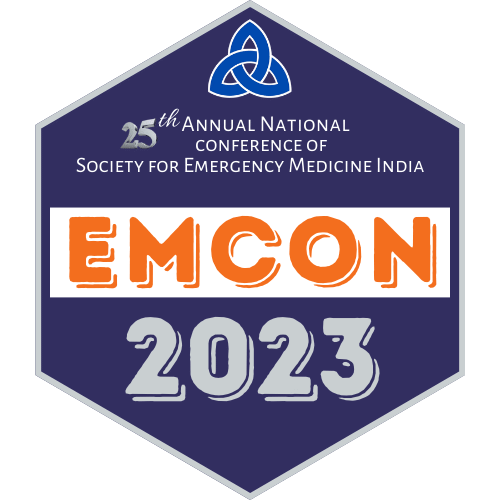About the course
We aim to help students / residents in the field of emergency medicine in their thesis preparation and research.
This course covers research methods, design, and statistical analysis for a thesis topic a student needs to cover during his postgraduation academic tenure. The student will be able to apply the skills learned by developing his/her own research question, gathering data, and analysing and reporting on the results using statistical methods.
Who should attend:
Postgraduate trainees in Emergency Medicine, Resident doctors and those interested in research preparation.
Topics
- Introduction to medical research and thesis writing
Scope: Covers the objectives of this course
Identifying a compelling research topic and crafting an effective strategy are key challenges in achieving success in research. You often find topics by closely examining real-world challenges. Alternatively, inspiration can come from the existing literature and participation in relevant conferences.
This course will emphasize a practical approach to selecting significant research topics and provide guidance on developing and presenting the same effectively. - Biostatistics overview
Scope: Covers research methods, design, and statistical analysis
Analytical biostatistical methods that have been found to be particularly useful and prevalent in the design and analysis of medical and public health research studies. Medical professionals and students are expected to understand and interpret correctly the journal articles summarizing research projects relevant to our health practices. Perusal of any research journal in medicine verifies this assertion through use of statistical techniques. We shall be reviewing the rationale and interpretation of basic statistical summaries and biostatistical analyses during this course. - Generating suitable research ideas
Scope: Covers research focus on enhancing patient outcomes and the significance of mentorship
Emergency care research is unique in its focus on time sensitive diseases and acute injuries at the cellular and patient levels.
Given the vastness of emergency medicine and numerous unanswered inquiries, beginners might struggle to pinpoint their research focus. A mentor can provide guidance in this regard. Mentorship is a vital factor in the achievements of junior researchers in emergency care. - Literature search and critical review of journal article
Scope: Covers how to collect relevant, timely research on your chosen topic and synthesize it into a cohesive summary of existing knowledge.
The goal of a literature analysis is to broaden and deepen your understanding of a work of literature. Reviewing literature is critical where the researcher analyses and evaluates many sources on a specific topic. We shall be evaluating how a literature search must be critically analysed and reviewed. - How to achieve study objectives
Scope: To identify crucial elements in research design
After identifying an area of interest for research, the next crucial step is to develop a viable research project. The course will emphasis on integrating elements in research that are hypothesis driven, mechanistic, sequential studies, highly focused, and bridging the gap between clinician and investigator. - Common mistakes in research synopsis
Scope: Covers common mistakes to avoid when writing a research article
Publishing a research article is an important part of being a graduate student. However, the process behind writing a research paper is not natural to most of us. Learning the rules and a few common mistakes to avoid will take you a long way when you are ready to publish your research. - Ethics committee approval and publication
Scope: Covers the tips for facing the ethics committee
The doctor- researcher must serve both the roles and at times the zeal of an investigator has the potential to cloud the morality of the physician inside. Thus, is it important to maintain the rules and regulations of ‘’Good Clinical Practice” in clinical research laid down by many regulatory bodies. The course with outline the requirements for ethics committee approval and publication of research papers. - Open House Discussion
Scope: To provide opportunity for the course participants to involve in group discussions and clarify doubts
The course concludes on the critical requirement of research projects in the realm of emergency care, highlighting the demand for novel approaches.
Course agenda
| Time | Topic | Faculty |
|---|---|---|
| 8:00 to 8:45 | Registration and Breakfast | |
| 8:45 to 9:00 | Introduction of faculty and delegates | Dr Sowjanya P / Dr Harshitha |
| 9:00 to 9:30 | Introduction to medical research and thesis writing | |
| 9:30 to 11:00 | Biostatistics overview | Dr Priyanka MK / Dr Harshitha |
| 11:00 to 11:15 | Coffee/Tea Break | |
| 11:15 to 12:00 | Generating suitable research ideas | |
| 12:00 to 12:45 | Literature search and critical review of journal article | — |
| 12:45 to 13:30 | Lunch Break | |
| 13:30 to 14:30 | How to achieve study objectives | |
| 14:30 to 15:15 | Common mistakes in research synopsis | Dr Harsha Makhwana |
| 15:15 to 16:00 | Ethics committee approval and publication | Dr Raghu Kondle |
| 16:00 to 16:15 | Coffee/Tea Break | |
| 16:15 to 17:00 | Open House Discussion | |
| 17:00 to 17:30 | Certificate distribution and Feedback | |
More pre-conference workshops
- Aeromedical workshop
- Airway skills – Beyond basics
- deTOX – Toxicology
- Drones in Emergency Medicine
- Emergency Care Skills – For Doctors
- Emergency Nursing Certification
- FirstAid & CPR for schools
- Gamification in EM
- Mechanical ventilator – Multiple locations
- Medicolegal Intelligence in Emergency
- MRCEM workshops
- Pediatric research network – PREDICT
- POCUS CESW – UK
- Trauma Masterclass – Thriving in high-pressure situations

